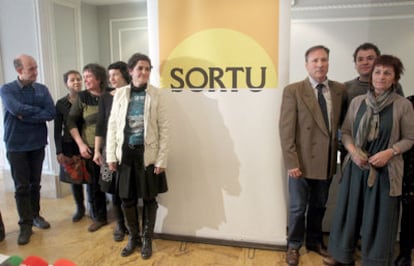Zapatero: 'abertzale' pledge a "great step"
New political grouping "not a continuation" of Batasuna, Sortu leaders declare
"What would the Popular Party and many right-wing newspaper editorials have said if the declaration of the abertzale had been made during the Aznar government?" José Luis Rodríguez Zapatero asked rhetorically yesterday at a closed-doors meeting of Socialist Congress, Senate and European Parliament members. "They would have said that it had all been thanks to this great government, to its tenacity, to its determination, to its efficiency..."
The prime minister, according to sources consulted after the meeting, was evidently pleased with the new abertzale grouping Sortu's rejection of any future acts of terrorism by ETA.
Zapatero was cautious in his appraisal of the statement by the successor to the outlawed Batasuna party. He said it was a "great step forward," but regretted that the government's antiterrorism policies remain "under suspicion."
Urkullu: "I believe that we are closer to the objective of an end to ETA"
'Abertzale' left rises again as Sortu
The presentation in Bilbao on Tuesday of the logo and name of the heir to Batasuna, the outlawed political ally of ETA that has been banned from running in elections since 2003, was delivered by six men and four women who were conspicuous by their lack of prominence in Basque abertzale radical left circles.
Karmele Agirregabiria, who spoke in Basque, and Iñaki Zabaleta Urkiola, a professor at the University of the Basque Country, who spoke in Castilian, delivered the communiqué calling for the latest incarnation of the abertzale to be legalized. The group, called Sortu (meaning Rise, or Birth, in English), is due in Madrid today where it will register its statutes at the Party Political Register.
The party's logo is a rising sun on an orange background, symbolic of a new dawn for abertzale politics. Sortu's most important political statement has been to reject ETA violence, the first time in the history of the Basque conflict that any incarnation of the radical left has done so. At the presentation of the new party - where its 10 representatives did not field questions - Sortu said its reference was socialism as a system to drive political and economic change removed from neoliberalism and that would serve to provide a more equitable distribution of wealth.
But Sortu's vision for the future of the Basque Country is some way from being realized. First, it must satisfy the requirements to be made legal. Reading the statement on Tuesday, Sortu's leadership noted that its political project complies with the Political Parties Law "in all its aspects" and that its repudiation of ETA terrorism was taken "without hesitation."
More symbolically, the political party is not "a continuation of anything," a reference to Sortu's determination to distance itself from association with Batasuna. Abertzale leader Rufi Etxeberria said that if the courts demand further proof of goodwill, "Sortu will have to carry out their requirements."
The leader of the conservative Basque Nationalist Party (PNV), Iñigo Urkullu, on Tuesday said the Socialist premier of the Basque Country, Patxi López, and the government have the opportunity to "take the path toward a new age." Urkullu warned that there was also the "risk that the lehendakari [Basque premier] does not want to take up the opportunity."
"I believe that we are closer to the objective of an end to ETA after yesterday's discrediting of ETA terrorism that the abertzale, after so much time and suffering, has undertaken."
López on Tuesday announced that he would confer with all the parties with a parliamentary presence in the region to assess the emergence of Sortu. The Basque government spokesman, Idoia Mendia, said that López viewed the rejection of ETA terrorism as "a new and positive development," although he admitted that there are many, including the opposition Popular Party (PP), who view the move with "skepticism."
The national PP leadership and that of the Basque Country have called on the government to deny Sortu the legitimacy it desires and ban it from participating in local elections on May 22. In this way, the PP believes, Sortu's conciliatory zeal will be put to the test. If after the May elections it still rejects ETA violence, it will have proved its resolve, PP analysts believe. Party spokesperson María Dolores de Cospedal took a firmer line, stating that Sortu should be excluded from elections until "ETA dissolves itself, lays down its arms, asks its victims for forgiveness and submits to the rule of law."

Tu suscripción se está usando en otro dispositivo
¿Quieres añadir otro usuario a tu suscripción?
Si continúas leyendo en este dispositivo, no se podrá leer en el otro.
FlechaTu suscripción se está usando en otro dispositivo y solo puedes acceder a EL PAÍS desde un dispositivo a la vez.
Si quieres compartir tu cuenta, cambia tu suscripción a la modalidad Premium, así podrás añadir otro usuario. Cada uno accederá con su propia cuenta de email, lo que os permitirá personalizar vuestra experiencia en EL PAÍS.
¿Tienes una suscripción de empresa? Accede aquí para contratar más cuentas.
En el caso de no saber quién está usando tu cuenta, te recomendamos cambiar tu contraseña aquí.
Si decides continuar compartiendo tu cuenta, este mensaje se mostrará en tu dispositivo y en el de la otra persona que está usando tu cuenta de forma indefinida, afectando a tu experiencia de lectura. Puedes consultar aquí los términos y condiciones de la suscripción digital.








































